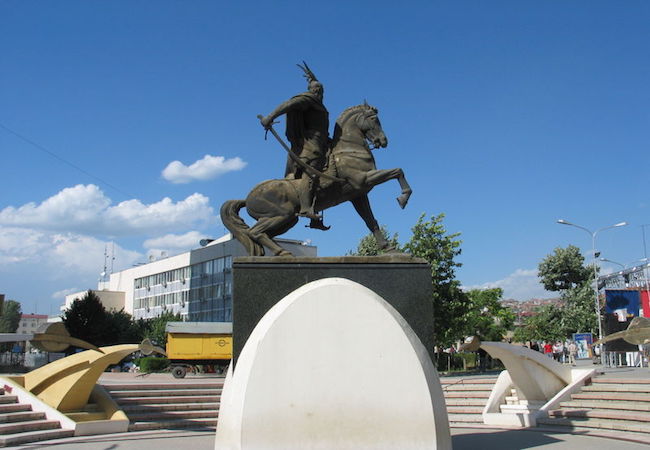
By Peter Tase
On August 28th, Prof. Dr. Sadri Ramabaja published a thoughtful analysis on the Albanian News Journal. In his article Prof Ramabaja notes: “Albanians, or at least half of them, for nearly a century, have tried to have Belgrade in their backs as the imposing political capital. They have now made up their mind as a nation, like the other nations of free Europe, with their political willingness, to share sovereignty with Brussels, but without having Belgrade once again as a point of reference! The Free Trade Agreement was signed on December 19, 2006, between the Western Balkan countries in the framework of Central Europe Free Trade Agreement (CEFTA). CEFTA is an international economic organization that was established with the purpose of preparing the former communist countries of Central and Southeastern Europe to integrate to the European Union (EU) in a faster and more natural way.”
Dr. Ramabaja adds that: “the lack of a clear geopolitical agenda of the EU for Southeastern Europe, especially for Albania and Albanians, gave birth to the improvised policies, such as the Berlin Process. Meanwhile, the Berlin process led to the birth of the “Common Western Balkans Market” (TPBP), in the form of the former Yugoslavia that was once created by J. B. Tito, minus Croatia and Slovenia, but adding Albania and Kosovo.”
Dr. Ramabaja emphasized: “Kosovo enters with a more specific status in this camouflaged “New Yugoslavia”, since Belgrade, in the framework of the so-called interior dialogue, is preparing to adapt the “two Germanys” model, considering the border between Serbia and Kosovo as an administrative boundary, while presenting this position as a contribution to peace and security in the region. Of course this allegedly flexible attitude of Belgrade is expected to be rewarded by Brussels!”
In continuation is the remainder of the article written by Dr. Sadri Ramabaja:
“Trieste Summit” of 12 July, where the first agreement for “The Common Western Balkans Market” (CWBM) was signed, may be described as the official date of birth of this Regional Economic Zone, that seems to be the most acceptable denomination than any other name that is more openly associated with the New Yugoslavia!
The informal meeting that took place in Durrës, where the Albanian Prime Minister Edi Rama hosted Kosovo Prime Minister Isa Mustafa, Serbian Prime Minister Ana Brnabic, Macedonian Prime Minister Zoran Zaev, Montenegrin Prime Minister Dusko Markovic and chairman of the Council of Ministers of Bosnia and Herzegovina, Denis Zvizdic, along with the “Godfather” of this structure, Commissioner Johannes Hahn and Cyril Muller, the World Bank’s Vice-President for Europe and Central Asia, generated no hopes that a similar fabricated agenda may enable forward looking steps related to the multiannual action plan for the Regional Economic Zone for which they agreed at the Trieste Summit.
“We have an action plan with 115 points in function of this transformation involving the movement of goods, services, capital, skilled workers, which will make the region much more attractive than what it is currently,” emphasized with much fanfare Albanian Prime Minister Rama.
But neither he nor the Serbian Prime Minister (I don‘t even want to mention the outgoing dwarfed Prime Minister of Kosovo), did not dare a conversation about the political agenda that would make this economic agenda credible!
Brussels now clearly understands that the “good words” addressed to the nations of Southeast Europe are no longer sufficient. Other powers, such as Russia and Turkey, even China, have shown interest in the framework of a new geopolitical repositioning. The presence of Russia and Turkey, particularly, is remarkable, especially in Serbia.
But, in spite of this, Commissioner Hahn again said, using the same language of a cold-blooded diplomat, as Frank-Walter Steinmeier once did in Kosovo (“Standards, before the status”!), while stressing that “the time when it will it be possible for the Western Balkans to achieve economic and democratic standards for entry into the EU has not yet been determined”.
“Quality and not speed in the integration process. The EU has invested heavily in the Western Balkans and the result will be its European integration,” he said in Durrës, creating uncertainty over any approximate deadline.
His colleague Wolfgang Petritsch, an Austrian career diplomat, an expert of the circumstances in the Western Balkans, was even more specific saying that “Kosovo needs over 30 years to reach European standards”!
Until the next meeting in the framework of the Berlin process, expected to be held in London next summer, meanwhile a farce interior dialogue over Kosovo is launched by Serbian President Aleksandar Vučić, but also the obstacles that his political puppets in Prishtina are setting forth to the nation’s factorization, will certainly be stored in the history‘s folders.
Anyways, the London meeting agenda will include the public political component. Until then I expect the ideologues of this process to learn the lesson No. 2 “Father, do you remember Psalm 29?” However, until then, the Father will have full attention to Psalm No. 29, which expressly states “Look ahead, aim higher, there you will gain the glory”.
The moral of this lesson: In your field of action you must always be well-informed otherwise you may lose good opportunities.
Albanians, or at least half of them, for nearly a century, have tried to consider Belgrade in their backs as an evident imposable political capital. Albanians have now made up their mind as a nation, like the other nations of free Europe, with their political willingness, to share sovereignty with Brussels, but without having one more time Belgrade as a point of reference!
Source:




